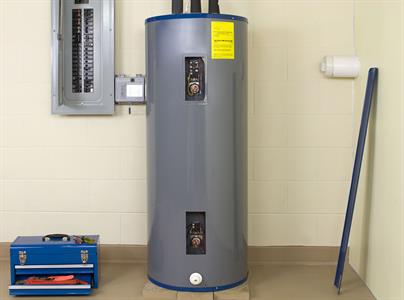A gas water heater may run out of hot water due to a malfunctioning thermostat or sediment buildup. Regular maintenance can prevent these issues and ensure a steady supply.
A gas water heater is a reliable source of hot water for your home. However, many homeowners experience a frustrating problem: running out of hot water too quickly. This can disrupt daily routines, especially during showers or laundry. Several factors contribute to this issue, such as improper thermostat settings, sediment accumulation, or a faulty dip tube.
Understanding these causes can help you troubleshoot effectively and maintain consistent hot water availability. Regular maintenance is crucial to prolong your heater’s lifespan and optimize its performance. This guide will explore common reasons for hot water shortages and offer practical solutions to keep your gas water heater running efficiently.

Credit: diy.stackexchange.com
Page Contents
Introduction To Hot Water Woes
Hot water is essential for daily tasks like showering and washing dishes. A reliable hot water supply keeps your home comfortable and functional. Problems with hot water can cause stress and inconvenience.
Several common reasons can lead to running out of hot water:
| Reason | Description |
|---|---|
| High Demand | Using multiple hot water sources at once can deplete supply. |
| Old Water Heater | Older units lose efficiency and may not heat water effectively. |
| Thermostat Issues | A faulty thermostat can prevent water from reaching the right temperature. |
| Sediment Build-Up | Mineral deposits can reduce heating efficiency in water heaters. |

Credit: www.allproplumbers.com
Initial Troubleshooting Steps
Check the pilot light first. A lit pilot light means the heater gets gas. If it’s out, follow the instructions to relight it. Ensure you turn off the gas before relighting.
Inspect for gas supply issues. Make sure the gas valve is open. Look for any leaks or blockages in the line. If you smell gas, turn off the valve and call a professional.
Check if the gas line is properly connected. Any loose connections can cause problems. Ensure that the thermostat is set at a suitable temperature.
Adjusting The Thermostat
Finding the ideal temperature setting for your gas water heater is important. Most experts recommend a setting between 120°F and 140°F. This range provides hot water without wasting energy. Check the thermostat on your heater to adjust the temperature.
Before making changes, always follow safety precautions. Turn off the gas supply to prevent accidents. Use a thermometer to check the water temperature. This ensures you do not burn yourself when testing the water. Always wear protective gloves while adjusting the thermostat.
Flushing The Tank
Regularly flushing the tank offers many benefits. It helps remove sediment buildup. This buildup can reduce hot water efficiency. Flushing improves heat transfer, which means more hot water. It also extends the life of the heater.
Follow these steps to flush your gas water heater:
| Step | Description |
|---|---|
| 1 | Turn off the heater’s power supply. |
| 2 | Connect a garden hose to the drain valve. |
| 3 | Open the drain valve and let water flow out. |
| 4 | Flush with cold water until clear. |
| 5 | Close the valve and remove the hose. |
| 6 | Turn the heater back on. |
Inspecting For Sediment Buildup
Sediment buildup can affect your gas water heater’s performance. This buildup often occurs at the bottom of the tank. Over time, it can block hot water flow.
Identifying sediment accumulation is crucial. Look for signs like fluctuating water temperature or strange noises. If the water heater takes longer to heat, sediment may be the cause.
| Methods for Sediment Removal | Description |
|---|---|
| Flushing the Tank | Drain water to remove sediment buildup. |
| Using a Wet/Dry Vacuum | Vacuum out sediment from the bottom. |
| Regular Maintenance | Schedule yearly inspections to prevent buildup. |
Checking The Dip Tube
The dip tube is a crucial part of gas water heaters. It helps direct cold water to the bottom of the tank. This allows hot water to rise and be used efficiently. A broken dip tube can cause short hot water supply. It may also lead to cold water mixing with hot water.
Signs of a faulty dip tube include inconsistent hot water temperature. Regularly check for any leaks or cracks in the tube. Replacing a dip tube is usually easy. First, turn off the water heater and cold water supply. Then, drain the tank and remove the old tube.
Install a new dip tube and reconnect everything. This simple fix can restore your hot water supply quickly.
When To Call A Professional
Recognizing the signs of a failing gas water heater is crucial. Common signs include strange noises from the heater, leaking water, or inconsistent hot water supply. If you notice a foul smell, it could indicate a serious problem. Burning smells or excessive heat may also be warnings.
Choosing a qualified technician is essential. Look for someone with certifications and experience. Check reviews and references to ensure they provide quality service. Ask about their warranty on repairs to protect your investment.
| Signs of Trouble | Action Needed |
|---|---|
| Strange noises | Call a technician |
| Leaking water | Immediate inspection |
| Inconsistent hot water | Professional assessment |

Credit: www.artplumbingandac.com
Preventive Measures For The Future
Establish a regular maintenance schedule for your gas water heater. This helps keep it running well. Check the temperature and pressure relief valve often. Flush the tank to remove sediment buildup. This prevents overheating and improves efficiency.
Consider upgrading your water heating system if it’s old or inefficient. New models save energy and provide more hot water. Look for energy-efficient units that meet your needs. Research tankless water heaters for endless hot water supply.
Frequently Asked Questions
Why Is My Gas Water Heater Running Out Of Hot Water?
Your gas water heater may run out of hot water due to sediment buildup, a faulty thermostat, or a malfunctioning dip tube. Check for leaks and ensure the heater is sized appropriately for your needs. Regular maintenance can help prevent these issues and extend the heater’s lifespan.
Why Is My Water Heater Constantly Draining Hot Water?
Your water heater may be draining hot water due to a faulty thermostat or a leaking valve. Sediment buildup can also cause overheating, leading to constant drainage. Check for leaks and consider flushing the tank to improve efficiency. Regular maintenance can prevent these issues from recurring.
Why Is My Gas Water Heater Not Keeping The Water Hot?
Your gas water heater may not keep water hot due to a faulty thermostat, sediment buildup, or a malfunctioning gas valve. Check for leaks or improper venting as well. Regular maintenance can help prevent these issues and ensure consistent hot water supply.
Why Is My Water Heater Not Producing Enough Hot Water?
Your water heater might not produce enough hot water due to a few common issues. Check the thermostat settings, sediment buildup, or a malfunctioning heating element. Insufficient tank size or high hot water demand can also contribute to the problem.
Regular maintenance helps prevent these issues.
Conclusion
Experiencing hot water shortages can be frustrating. Understanding the common causes is essential for effective solutions. Regular maintenance and timely repairs can prevent this issue. Consider upgrading to a more efficient model if problems persist. Taking action now ensures you enjoy consistent hot water when you need it most.
